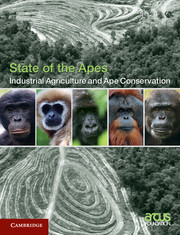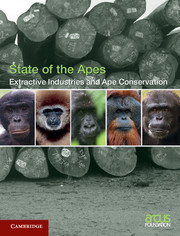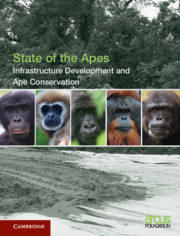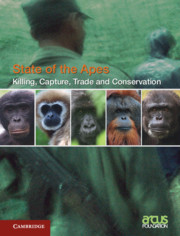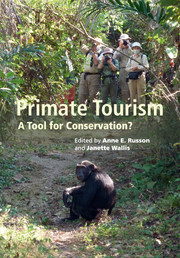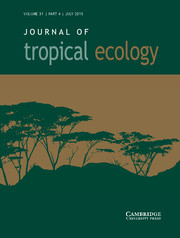Industrial Agriculture and Ape Conservation
$35.99 (P)
Part of State of the Apes
- Author: Arcus Foundation
- Date Published: March 2016
- availability: Temporarily unavailable - available from TBC
- format: Paperback
- isbn: 9781316505236
$
35.99
(P)
Paperback
Other available formats:
Hardback
Looking for an examination copy?
If you are interested in the title for your course we can consider offering an examination copy. To register your interest please contact [email protected] providing details of the course you are teaching.
-
Social and economic systems worldwide are changing rapidly. These changes are accompanied by an increasing demand for natural resources, including land, water, minerals, energy sources, food and timber. Today's foremost challenge lies in finding the tools to address the complexity of these interrelated trends, and in implementing strategies to balance environmental and socioeconomic needs. This volume contributes to this search by presenting original research, topical case studies and emerging best practice from a range of key stakeholders to examine the interface between ape conservation and industrial agriculture. In assessing the drivers behind agricultural expansion and land investments, it sheds light on governance challenges and legal frameworks that shape land use. Intended for policy makers, industry experts, decision makers, academics, researchers and NGOs, it is designed to inform debate, practice and policy to help reconcile the goals of industrial agriculture with those of ape conservation and welfare, and social and economic development. This title is also available as Open Access via Cambridge Books Online.
Read more- The second volume to be published in an important new series, using objective and rigorous analysis to present, for the first time, statistics and information on all non-human ape species
- Intended to enhance and influence debate, practice and policy for a broad range of policy makers, industry experts, decision makers, academics, researchers and NGOs
- Beautifully illustrated in full colour throughout
- This title is also available as Open Access via Cambridge Books Online
Reviews & endorsements
Review of the series:
"Truly groundbreaking … Through keen analysis and vivid research, the [State of the Apes] series considers the survival of the world's ape species in light of both long-standing and newly emerging threats, such as mineral extraction, energy exploration, agricultural expansion and land conversion - forces that will continue to shape not only the future of wild apes, but also of all remaining blocks of wild habitat and the extraordinary biodiversity they contain. By examining the complexity of development forces across range states, [this series] offers an informed and realistic assessment of the prospects for ape conservation, as well as outlining the potential of policies that may spell the difference between destruction and survival of these extraordinary beings."
Matthew V. Cassetta, US Department of StateCustomer reviews
Not yet reviewed
Be the first to review
Review was not posted due to profanity
×Product details
- Date Published: March 2016
- format: Paperback
- isbn: 9781316505236
- length: 358 pages
- dimensions: 244 x 245 x 16 mm
- weight: 0.76kg
- contains: 1 b/w illus. 112 colour illus. 18 tables
- availability: Temporarily unavailable - available from TBC
Table of Contents
Notes to readers
Acknowledgments
Apes overview
Introduction
Part I. Industrial Agriculture and Ape Conservation:
1. Economic development and conservation of biodiversity: understanding the interface of ape conservation and industrial agriculture
2. Encroaching on ape habitat: deforestation and industrial agriculture in Cameroon, Liberia and on Borneo
3. From habitat to plantation: causes of conversion in sub-Saharan Africa
4. Legal frameworks at the interface between industrial agriculture and ape conservation
5. From process to impact of a voluntary standard: the Roundtable on Sustainable Palm Oil
6. Impacts of industrial agriculture on ape ecology
Part II. The Status and Welfare of Great Apes and Gibbons:
7. Ape populations over time: case studies from Gombe, Mount Halimun Salak, Sabangau and Wamba
8. The status of captive apes
Annexes
Acronyms and abbreviations
Glossary
References
Index.
Sorry, this resource is locked
Please register or sign in to request access. If you are having problems accessing these resources please email [email protected]
Register Sign in» Proceed
You are now leaving the Cambridge University Press website. Your eBook purchase and download will be completed by our partner www.ebooks.com. Please see the permission section of the www.ebooks.com catalogue page for details of the print & copy limits on our eBooks.
Continue ×Are you sure you want to delete your account?
This cannot be undone.
Thank you for your feedback which will help us improve our service.
If you requested a response, we will make sure to get back to you shortly.
×
